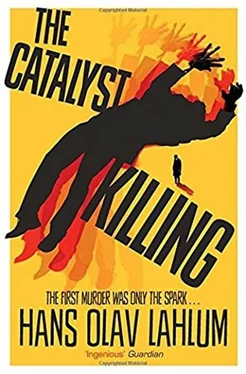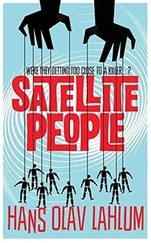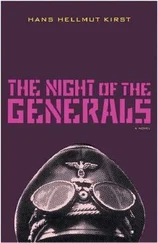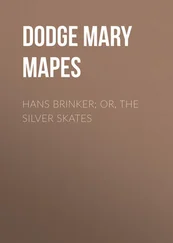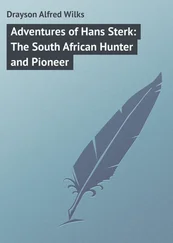This hit the mark. She smiled back and assured me that she always kept an eye on him, but that she would keep an even closer eye in the days ahead. She would, as usual, drive him to and from the rally tomorrow herself, and would personally ensure that her husband’s good friends in the labour movement were watched like hawks.
We parted on a positive note at half past twelve. She followed me to the door, and he waved a couple of fingers gently from his place behind his desk. I had lost none of my respect or fascination for Trond Bratten when I descended the steps. The contrast with the prime minister was striking. But I found it easy to like them both. And I thought to myself that I had just seen a rare and fine example of a couple who worked well together despite a considerable difference in age and temperament. For several reasons, it had been an enjoyable break from the investigation.
I barely had time to grab two dry buns from a baker’s shop for lunch before arriving at Victoria Terrace as agreed.
This time, Asle Bryne was not sitting alone in his office. Beside him sat a far younger man, with a prominent mole on his chin. I was relieved to discover that Miriam Filtvedt Bentsen was observant and still to be trusted.
I held out my hand to the new man, but was stopped by Asle Bryne’s authoritative hand.
‘Please wait a moment before you start talking: we first have to clarify the terms. The fact that I am allowing an employee to be at such a meeting is exceptional. But then, the situation is exceptional, and I understand your need to resolve it. I would like to state, however, that this man has done nothing criminal, but on the contrary has made a considerable and important contribution to our country and its people. I expect him to be treated with respect, and this conversation to remain strictly confidential. Are the terms clear?’
I gave a quick nod. Asle Bryne then made a great fuss of lighting his pipe, and disappeared behind a cloud of smoke. The man beside him held out his hand. His handshake was firm and strong, though I detected a slight tremor.
I sat down and asked first of all if he was the ‘XY’ who had written the report. He nodded. I proceeded to say that I now needed to know his name, in the strictest confidence. He turned and looked at Bryne, waiting for a response. Somewhere inside the grey cloud of smoke, Bryne’s great black eyebrows rose and fell.
‘My name is Pedersen. Stein Pedersen. But I would be extremely grateful if no one else heard it, as that would make my continued work in preventing a communist takeover very difficult.’
Both Bryne and I gave a nod, though mine was more reserved than his. I was surprised at how well I was managing to play my role. The opening was a small sensation. Were the initials SP just a coincidence, or was I now sitting opposite the man who planned to carry out an attack against someone or other, at some place, within the next few days? Was it really possible that such an attack would come from inside the police security service?
I focused my concentration and asked him first to tell me about his impressions from the evening that Marie Morgenstierne was shot. Stein Pedersen nodded, and repeated in a monotone voice the main points of his written report. He did not give any new details about the two men on the side roads, or about any of the other people who were on the road.
When I asked if anyone might have seen the cassette being handed over, he was ‘at least ninety-nine per cent’ certain that they could not have done so. It was done in passing, and he had not seen anyone ahead or behind them on the road either before or after it happened. Kristine Larsen had only appeared behind him several minutes later, and had then overtaken him quickly, with determined steps.
As for his earlier contact with Marie Morgenstierne, Stein Pedersen did not have anything of importance to add. She had contacted him a few weeks after Falko Reinhardt had disappeared, and had later routinely provided him with tapes, but it had been a very perfunctory contact with little extra information. He had been given her telephone number and had rung her on a few occasions, but claimed never to have been to her home. And he denied, somewhat horrified and indignant, that he had ever had any kind of romantic or physical relationship with her.
‘First of all, my work for my country does not leave me any time for women. And what is more, were that not the case, young communist women would certainly not be my preference!’ he objected.
It looked as though Asle Bryne’s eyebrows approved of this, but the smoke around him was now so dense that I could not have said for certain.
I swiftly changed the subject to talk about the circumstances surrounding Falko Reinhardt’s disappearance. Pedersen immediately sank a little into his chair. Asle Bryne, on the other hand, perked up. Between two long puffs on his pipe, he said: ‘Procedures have unfortunately been broken, albeit with the best intentions and without any harm being done. Just tell the truth!’
Pedersen nodded gratefully, and immediately continued.
‘My behaviour was unprofessional in the extreme. But I had for months spent a lot of time on the group and was convinced they were going to plan something serious while they were at the cabin – perhaps, in the worst-case scenario, meet some foreign agents. I felt that my most important duty and responsibility was to protect society against them. Our budgets and work schedules did not allow surveillance of the group in Valdres, but I was off work that week and, following a struggle with my conscience, decided to go up there on my own initiative. Hence the mask, which was in clear breach of normal procedures. I did this partly so that they would not recognize me if they saw me, and partly to prevent any suspicion that the police security service was involved.’
I attempted to give an understanding nod.
‘And what was the outcome of your trip? Were there any indications of foreign contacts or that any of them were planning something serious?’
He shook his head.
‘The whole thing was, technically, a fiasco. I am still convinced that they went there to talk about something that they wanted to keep under wraps. But the cabin was far less accessible than I had thought, and the weather was terrible. I was not able to hide any microphones in the cabin, and I barely managed to get within sight of it. My first attempt to spy through the window ended with me being spotted by Miriam Filtvedt Bentsen. So I beat a hasty retreat and drove back down to Oslo again. I only heard that Falko Reinhardt had gone missing on the radio the following day.’
‘A large car was seen driving down the valley in the middle of the night, after Falko had disappeared. Was that your car?’
He shook his head again.
‘I was driving my own car, which was a small Ford, and by the time that happened, I was already back in Oslo. I know nothing about the car you mentioned, or who might have been driving it. I do know, however, where Falko went when he left the others for a couple of hours earlier in the day, and whom he met there.’
He sent me a meaningful look. I tried to stay collected, and waved him on impatiently.
‘I watched him from a distance, with the help of ordinary binoculars, from my stakeout in the forest. He was walking fast and passed only twenty yards or so from me. Then he carried on out of the forest and across the fields of the neighbouring farm. There he met the farmer himself, who appeared a few minutes later with a mowing machine as a cover. It looked as though the meeting had been planned, and that they did not want anyone to see!’
He said this in almost a whisper. I gave a short nod of acknowledgement.
‘And was the farmer a well-built, older man?’
Читать дальше
